高中英语情态动词讲解课件(共29张)
图片预览
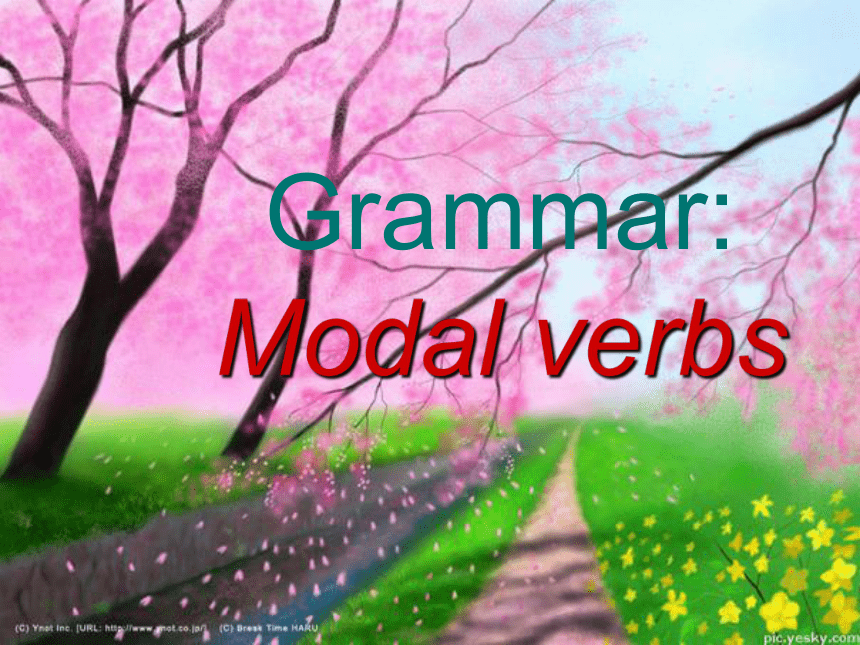
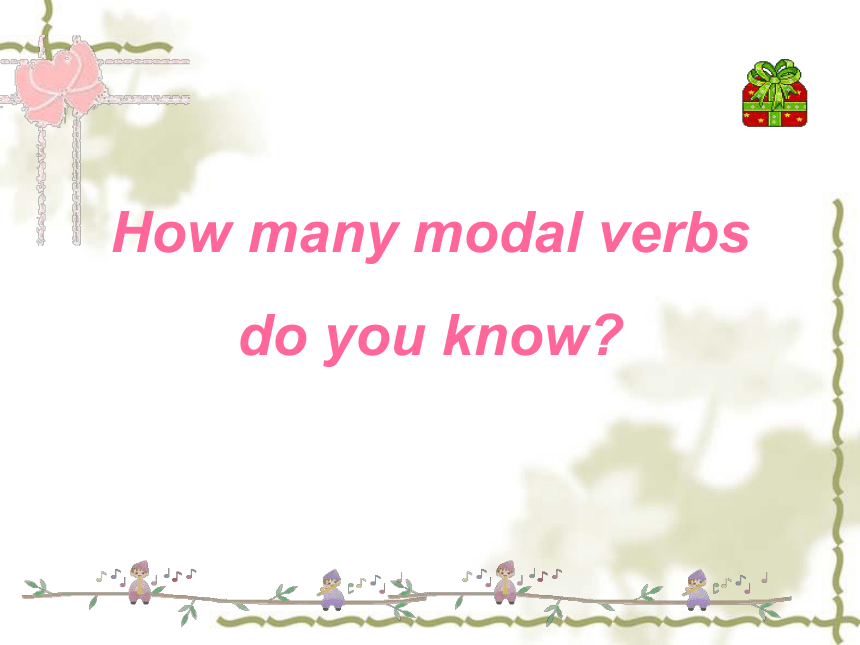
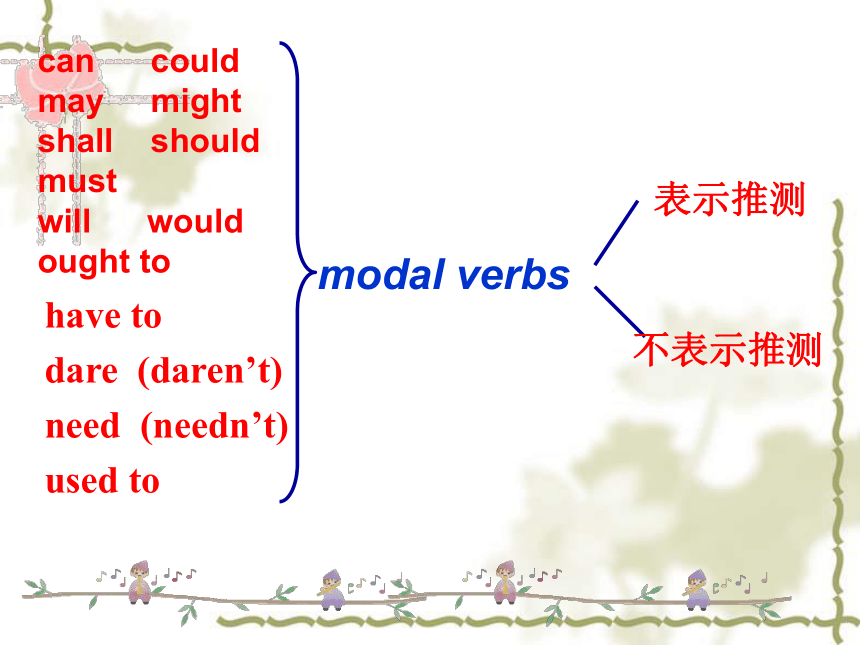
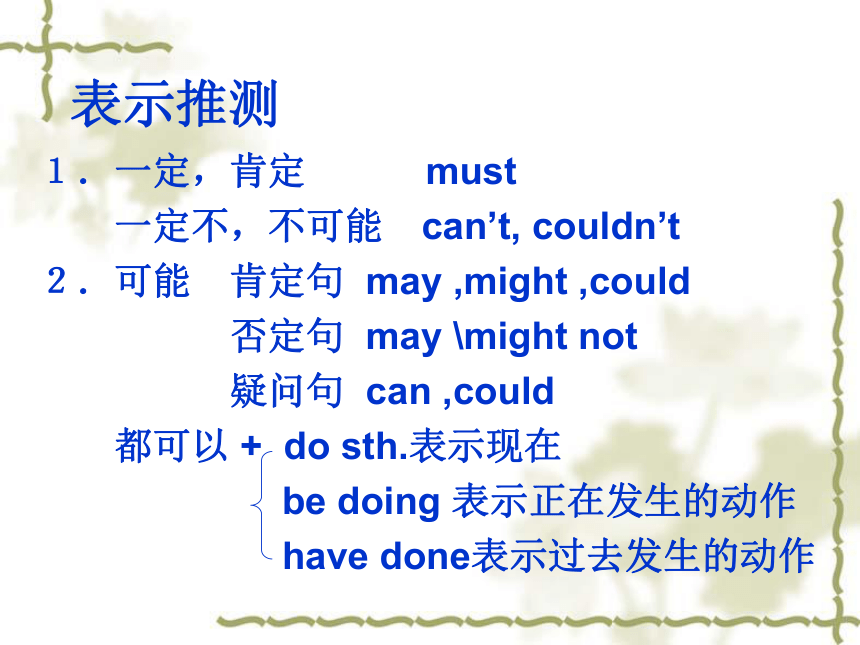
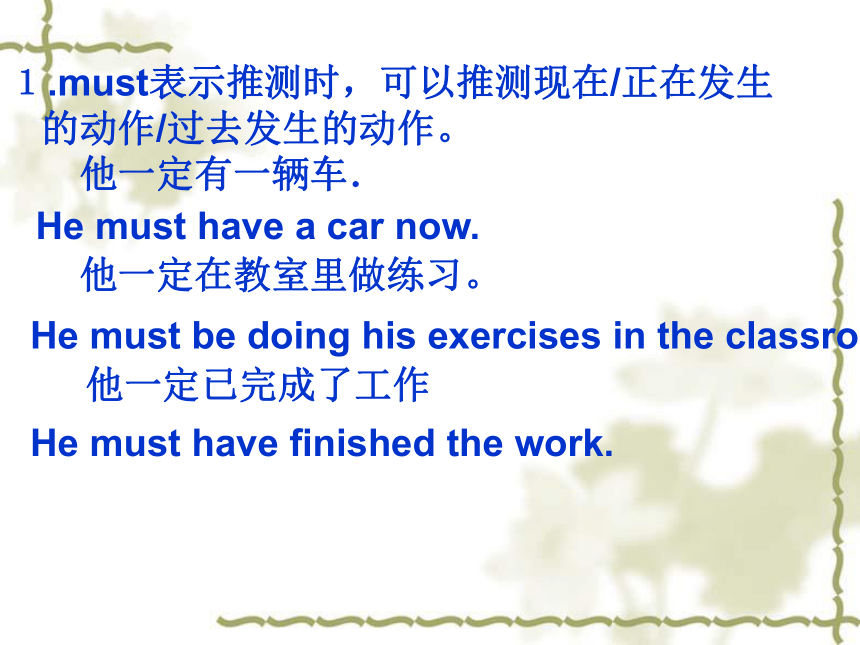
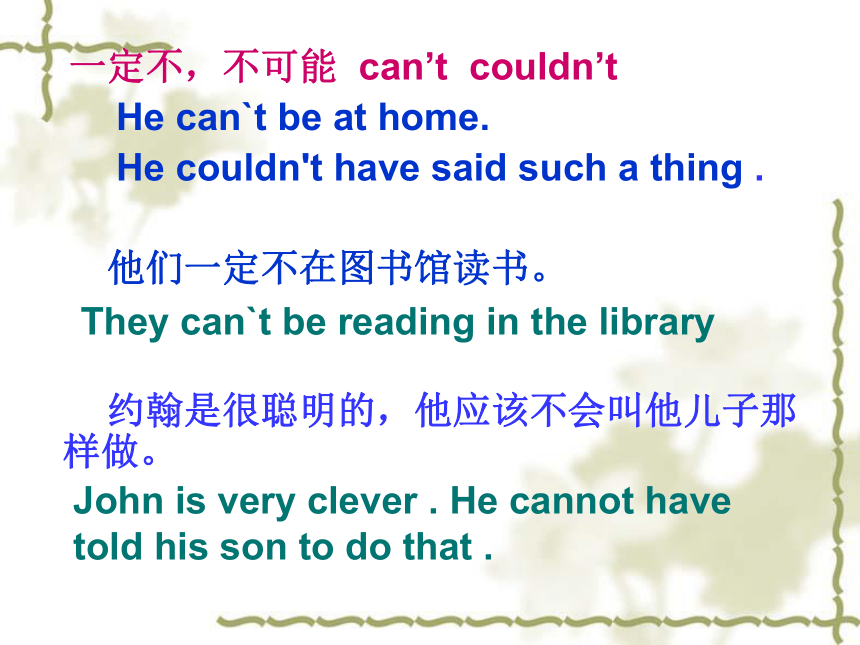
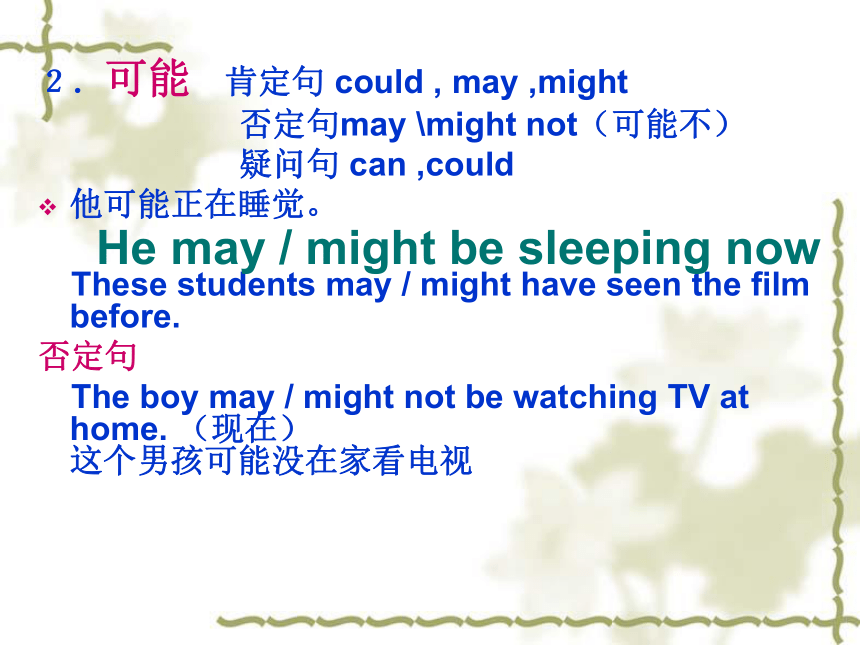
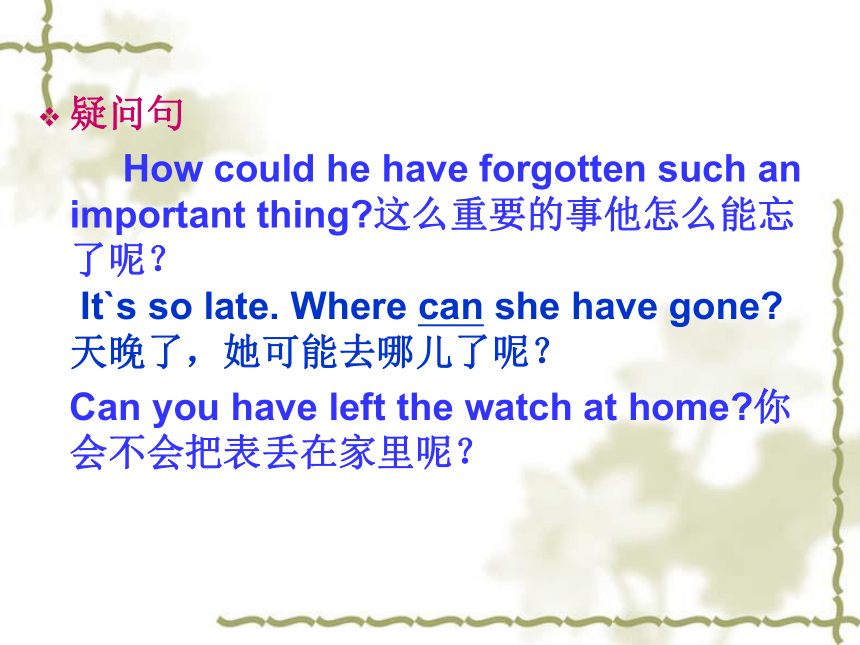
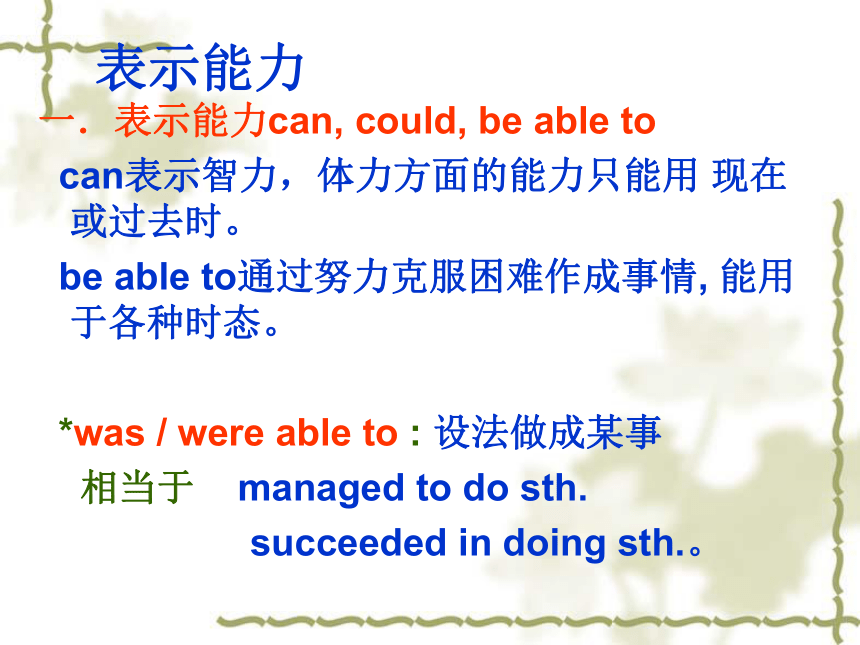
文档简介
课件29张PPT。Grammar: Modal verbsHow many modal verbs
do you know?can could
may might
shall should
must
will would
ought tohave to
dare (daren’t)
need (needn’t)
used to表示推测不表示推测modal verbs表示推测1.一定,肯定 must
一定不,不可能 can’t, couldn’t
2.可能 肯定句 may ,might ,could
否定句 may might not
疑问句 can ,could
都可以 + do sth.表示现在
be doing 表示正在发生的动作
have done表示过去发生的动作He must have a car now.
1.must表示推测时,可以推测现在/正在发生的动作/过去发生的动作。 他一定有一辆车.
他一定在教室里做练习。
他一定已完成了工作He must have finished the work.He must be doing his exercises in the classroom. 一定不,不可能 can’t couldn’t
He can`t be at home.
He couldn't have said such a thing .
他们一定不在图书馆读书。
约翰是很聪明的,他应该不会叫他儿子那样做。
They can`t be reading in the libraryJohn is very clever . He cannot have told his son to do that .
2.可能 肯定句 could , may ,might
否定句may might not(可能不)
疑问句 can ,could
他可能正在睡觉。
These students may / might have seen the film before.
否定句
The boy may / might not be watching TV at home. (现在) 这个男孩可能没在家看电视 He may / might be sleeping now疑问句
How could he have forgotten such an important thing?这么重要的事他怎么能忘了呢? It`s so late. Where can she have gone? 天晚了,她可能去哪儿了呢?
Can you have left the watch at home?你会不会把表丢在家里呢?
表示能力一.表示能力can, could, be able to
can表示智力,体力方面的能力只能用 现在或过去时。
be able to通过努力克服困难作成事情, 能用于各种时态。
*was / were able to : 设法做成某事
相当于 managed to do sth.
succeeded in doing sth.。can与be able to 用法区别常与句子时态有关
1.现在时比较
1) 表示”能力”时,be able to 不用于第二人称,
You are able to do the work, I think. (X) 改用can
can与感官动词feel, hear, see, smell, taste连用时, can显得可有可无,因而失去了情态动词的意义,这种情况下can不能用be able to 代替
e.g., We can see beautiful flowers and green trees here and there.
Anyone can see it is of no use.
3) can与某些表示意念的动词如:understand, remember, forget, hope, imagine, believe, suppose等连用时,同样没有情态动词的意义,也不可用be able to取代。
e.g. I can’t believe there are so many tall buildings now in my home town
2.过去时比较
was/were able to 意含”经过努力” “凭借才能” 获得的”能力”常与”manage to ”相通
They were short of modern machines, but they were able to complete the project in time.
二.表示允许can, could ,may, might
might,could 表达更客气、委婉、礼貌的请求语气。
Excuse me, could you tell me the way to the bus station?
Could you help me?
You can go now if you like.
May I smoke in the room?三.表示必须ought to/should have to must
*have to 能用于各种时态,且有人称和数的变化.
ought to 的否定式为ought not to或者
oughtn’t to
1.should 和ought to
大多数情况下,含义基本相同,should主要看主观看法,ought to更多反映客观情况,在谈到法律,规定,义务时使用。
如:you should try your best to pass the entrance examanations.
We ought to go and see hellen,but I think we have no time.
Should 还可以表示惊讶,出乎意料的意思
Why should he do such a thing? 2.must与have to 的用法
前者侧重于主观意念,后者则用于表示客观条件或义务,译为”只好” “不得不”
e.g., He must work to make his living.
He has to beg for a living.
Must没有过去式,在单句中若是过去时,须用had to
e.g., He begged from door to door, for he had to do so to live
若在从句中,则可用must来表示过去
e.g., He said he must manage to own a new house for Easter.
must用于疑问句,表示责备、抱怨的感彩,意思为“偏要,硬要、干嘛”; 四.表示虚拟1.should have done 本应该做(而没做)
should not have done 本不应该做
He shouldn‘t have said such a thing .他当时不应该说那种话。
We should have studied last night, but we went to the concert instead
*这种句式也能用ought to2.need not have done 没有必要做某事
I need not have got up so early . 我本来不必要那么早起床的(事实上早已起床)
I need not have waited for the train for an hour. 我本来不必要等一个小时的火车。(事实上已经等了一个小时)
3. could have done
它表示“过去本来能够…” 实际上没能做…。
If you could have finished the task in time,you could have been promoted. 如果你当时能如期完成那任务的话,你可能已提升了(实际上没有被提升)
I could have laughed to hear him talk like that.听他那样讲话,我差点笑出声来。4.might have done虚拟式表示与过去事实相反的假没结果。
If she had started a little earlier, she might have been in time for the train.如果她早点出发,她有可能及时赶上火车。(实际上没有早出发,便没有赶上火车)
It might have been better to stop then.如果那时就停止的话,也许比较好。
5.would have done
它表示的是与过去事实相反之假设的结果,意思是“当时就会…了”而实际上没有…
I would have helped you if I had known of your difficulties .
If it hadn‘t rained yesterday, we would have gone climbing .假如昨天没下雨,我们就去了。(实际上没有去)。
五.其他情态动词用法
1情态动词dare, need 通常用于否定句或疑问句
Who dare do it?
Dare you go out alone ?
dare, need 还可用作行为动词,可以用于各种句式,后面可跟加to的不定式
A. who dare do it? B.He dares to do it.
A.He needn’t do it B.he needs to do it
上述句子中A句为含情态动词的句子,B句中dare. need 均为行为动词
注意动词 dare 的某些特殊用法。 1)固定句型.I dare say. 我敢说.我猜想/以为
Don’t worry, sir. I dare say, nobody will come again
2) 作为行为动词dare在 否定句中后面的TO可以省略.
e.g: He doesn’t dare (to) go to the forest done at night.
The man never dares (to) do anything without his owner’s permission.
5. dare “敢”,多用在否定或疑问句中。
The little girl dare not speak in public. 小女孩不敢在公众面前说话。
Dare you catch the little cat? 你敢抓小猫吗?
dare 除用作情态动词外,更多的是当实义动词使用, 用法同实义动词一样,要考虑人称,单复数,时态等。
Do you dare to walk in the dark? 你敢黑夜走路吗?
He doesn't dare to tell the teacher what happened that day. 他不敢告诉老师那天发生的事。2.will
I. 表现在经常发生的情况.
e.g., The man will go to work every day.(= The man goes to work every day 后者更常用)
The door won’t open.
II.表示“决心”“意愿”“可能”等
e.g If you will come tonight, he’ll meet you, I think.
This will be the book you are looking for.
Will you come in ? (=Will you please come in?)III. 若表示过去,则用would
e.g., He would take a walk after supper when he lived in the country.
He said he would help.
表示“过去常常…”除了用would,还可以用used to,不过后者常常含有“现在不…”之意。
e.g., When young, he would go out for a trip on Sundays. (Now maybe still does)
When young, he used to go out for a trip.(But now he doesn’t)
此外,would表示“过去常常…”时后面动词须是某种行为或动作,不能是静态动词 。
e.g., Near the village, there _____ be a stream.
A. would B. used to Would更多的用来表示语气而不是时态
Will/would you please do...,
Would you like to do...,
Would you mind doing...
都表示建议、询问、请求等。
e.g., Would/ Will you mind opening the windows?
I would / will do anything for you , sir.
有时甚至只能用would而不用will
e.g., I would like…. Would you like….?
They would love…. He would rather …… 3.shall
I. 表示询问或征求别人的意见看法用于一、三人称
e.g., Shall I open the door?要我开门吗?
Shall he stay here for the night? 让他留下过夜吗?
II.表示说话人的允诺,警告,命令,威胁等,用于二、三人称
e.g., If you work well ,you shall be well paid
He says he won’t come, but I say he shall.
If you go there again, you shall lose what you’ve got.
III表示规章,知识,预言等.
Each competitor shall wear a number.
The rules shall be obeyed.
6.反义疑问句 在反意疑问句中,当附属部分含有表示推测意义的must,can’t时,疑问部分的助动词应与must ,can’t后面的动词在非推测情况下的用法保持一致。
1. He must be a worker, ?
2. It must have rained last night, ?
3. You must have learned English for many years,
?
4. He can`t be a teacher, ?
5. She can`t have finished her homework, ? didn`t ithaven`t youisn`t heis hehas she
do you know?can could
may might
shall should
must
will would
ought tohave to
dare (daren’t)
need (needn’t)
used to表示推测不表示推测modal verbs表示推测1.一定,肯定 must
一定不,不可能 can’t, couldn’t
2.可能 肯定句 may ,might ,could
否定句 may might not
疑问句 can ,could
都可以 + do sth.表示现在
be doing 表示正在发生的动作
have done表示过去发生的动作He must have a car now.
1.must表示推测时,可以推测现在/正在发生的动作/过去发生的动作。 他一定有一辆车.
他一定在教室里做练习。
他一定已完成了工作He must have finished the work.He must be doing his exercises in the classroom. 一定不,不可能 can’t couldn’t
He can`t be at home.
He couldn't have said such a thing .
他们一定不在图书馆读书。
约翰是很聪明的,他应该不会叫他儿子那样做。
They can`t be reading in the libraryJohn is very clever . He cannot have told his son to do that .
2.可能 肯定句 could , may ,might
否定句may might not(可能不)
疑问句 can ,could
他可能正在睡觉。
These students may / might have seen the film before.
否定句
The boy may / might not be watching TV at home. (现在) 这个男孩可能没在家看电视 He may / might be sleeping now疑问句
How could he have forgotten such an important thing?这么重要的事他怎么能忘了呢? It`s so late. Where can she have gone? 天晚了,她可能去哪儿了呢?
Can you have left the watch at home?你会不会把表丢在家里呢?
表示能力一.表示能力can, could, be able to
can表示智力,体力方面的能力只能用 现在或过去时。
be able to通过努力克服困难作成事情, 能用于各种时态。
*was / were able to : 设法做成某事
相当于 managed to do sth.
succeeded in doing sth.。can与be able to 用法区别常与句子时态有关
1.现在时比较
1) 表示”能力”时,be able to 不用于第二人称,
You are able to do the work, I think. (X) 改用can
can与感官动词feel, hear, see, smell, taste连用时, can显得可有可无,因而失去了情态动词的意义,这种情况下can不能用be able to 代替
e.g., We can see beautiful flowers and green trees here and there.
Anyone can see it is of no use.
3) can与某些表示意念的动词如:understand, remember, forget, hope, imagine, believe, suppose等连用时,同样没有情态动词的意义,也不可用be able to取代。
e.g. I can’t believe there are so many tall buildings now in my home town
2.过去时比较
was/were able to 意含”经过努力” “凭借才能” 获得的”能力”常与”manage to ”相通
They were short of modern machines, but they were able to complete the project in time.
二.表示允许can, could ,may, might
might,could 表达更客气、委婉、礼貌的请求语气。
Excuse me, could you tell me the way to the bus station?
Could you help me?
You can go now if you like.
May I smoke in the room?三.表示必须ought to/should have to must
*have to 能用于各种时态,且有人称和数的变化.
ought to 的否定式为ought not to或者
oughtn’t to
1.should 和ought to
大多数情况下,含义基本相同,should主要看主观看法,ought to更多反映客观情况,在谈到法律,规定,义务时使用。
如:you should try your best to pass the entrance examanations.
We ought to go and see hellen,but I think we have no time.
Should 还可以表示惊讶,出乎意料的意思
Why should he do such a thing? 2.must与have to 的用法
前者侧重于主观意念,后者则用于表示客观条件或义务,译为”只好” “不得不”
e.g., He must work to make his living.
He has to beg for a living.
Must没有过去式,在单句中若是过去时,须用had to
e.g., He begged from door to door, for he had to do so to live
若在从句中,则可用must来表示过去
e.g., He said he must manage to own a new house for Easter.
must用于疑问句,表示责备、抱怨的感彩,意思为“偏要,硬要、干嘛”; 四.表示虚拟1.should have done 本应该做(而没做)
should not have done 本不应该做
He shouldn‘t have said such a thing .他当时不应该说那种话。
We should have studied last night, but we went to the concert instead
*这种句式也能用ought to2.need not have done 没有必要做某事
I need not have got up so early . 我本来不必要那么早起床的(事实上早已起床)
I need not have waited for the train for an hour. 我本来不必要等一个小时的火车。(事实上已经等了一个小时)
3. could have done
它表示“过去本来能够…” 实际上没能做…。
If you could have finished the task in time,you could have been promoted. 如果你当时能如期完成那任务的话,你可能已提升了(实际上没有被提升)
I could have laughed to hear him talk like that.听他那样讲话,我差点笑出声来。4.might have done虚拟式表示与过去事实相反的假没结果。
If she had started a little earlier, she might have been in time for the train.如果她早点出发,她有可能及时赶上火车。(实际上没有早出发,便没有赶上火车)
It might have been better to stop then.如果那时就停止的话,也许比较好。
5.would have done
它表示的是与过去事实相反之假设的结果,意思是“当时就会…了”而实际上没有…
I would have helped you if I had known of your difficulties .
If it hadn‘t rained yesterday, we would have gone climbing .假如昨天没下雨,我们就去了。(实际上没有去)。
五.其他情态动词用法
1情态动词dare, need 通常用于否定句或疑问句
Who dare do it?
Dare you go out alone ?
dare, need 还可用作行为动词,可以用于各种句式,后面可跟加to的不定式
A. who dare do it? B.He dares to do it.
A.He needn’t do it B.he needs to do it
上述句子中A句为含情态动词的句子,B句中dare. need 均为行为动词
注意动词 dare 的某些特殊用法。 1)固定句型.I dare say. 我敢说.我猜想/以为
Don’t worry, sir. I dare say, nobody will come again
2) 作为行为动词dare在 否定句中后面的TO可以省略.
e.g: He doesn’t dare (to) go to the forest done at night.
The man never dares (to) do anything without his owner’s permission.
5. dare “敢”,多用在否定或疑问句中。
The little girl dare not speak in public. 小女孩不敢在公众面前说话。
Dare you catch the little cat? 你敢抓小猫吗?
dare 除用作情态动词外,更多的是当实义动词使用, 用法同实义动词一样,要考虑人称,单复数,时态等。
Do you dare to walk in the dark? 你敢黑夜走路吗?
He doesn't dare to tell the teacher what happened that day. 他不敢告诉老师那天发生的事。2.will
I. 表现在经常发生的情况.
e.g., The man will go to work every day.(= The man goes to work every day 后者更常用)
The door won’t open.
II.表示“决心”“意愿”“可能”等
e.g If you will come tonight, he’ll meet you, I think.
This will be the book you are looking for.
Will you come in ? (=Will you please come in?)III. 若表示过去,则用would
e.g., He would take a walk after supper when he lived in the country.
He said he would help.
表示“过去常常…”除了用would,还可以用used to,不过后者常常含有“现在不…”之意。
e.g., When young, he would go out for a trip on Sundays. (Now maybe still does)
When young, he used to go out for a trip.(But now he doesn’t)
此外,would表示“过去常常…”时后面动词须是某种行为或动作,不能是静态动词 。
e.g., Near the village, there _____ be a stream.
A. would B. used to Would更多的用来表示语气而不是时态
Will/would you please do...,
Would you like to do...,
Would you mind doing...
都表示建议、询问、请求等。
e.g., Would/ Will you mind opening the windows?
I would / will do anything for you , sir.
有时甚至只能用would而不用will
e.g., I would like…. Would you like….?
They would love…. He would rather …… 3.shall
I. 表示询问或征求别人的意见看法用于一、三人称
e.g., Shall I open the door?要我开门吗?
Shall he stay here for the night? 让他留下过夜吗?
II.表示说话人的允诺,警告,命令,威胁等,用于二、三人称
e.g., If you work well ,you shall be well paid
He says he won’t come, but I say he shall.
If you go there again, you shall lose what you’ve got.
III表示规章,知识,预言等.
Each competitor shall wear a number.
The rules shall be obeyed.
6.反义疑问句 在反意疑问句中,当附属部分含有表示推测意义的must,can’t时,疑问部分的助动词应与must ,can’t后面的动词在非推测情况下的用法保持一致。
1. He must be a worker, ?
2. It must have rained last night, ?
3. You must have learned English for many years,
?
4. He can`t be a teacher, ?
5. She can`t have finished her homework, ? didn`t ithaven`t youisn`t heis hehas she
